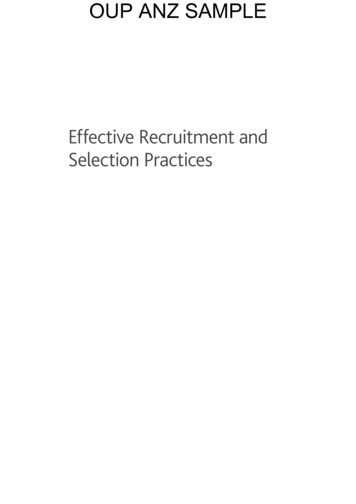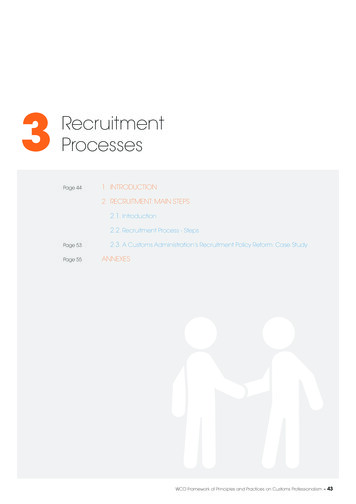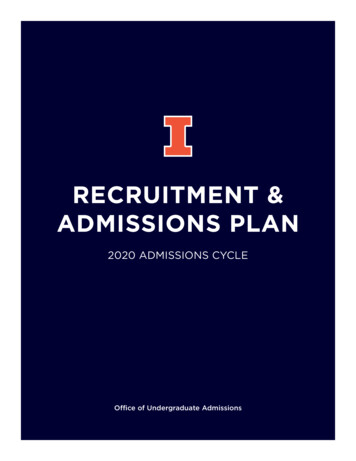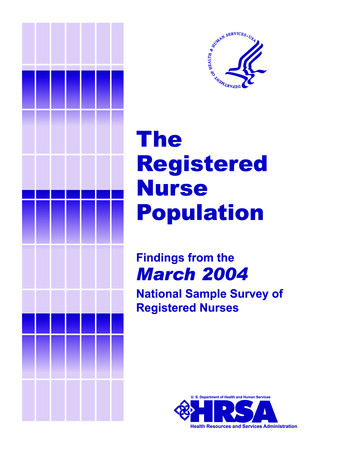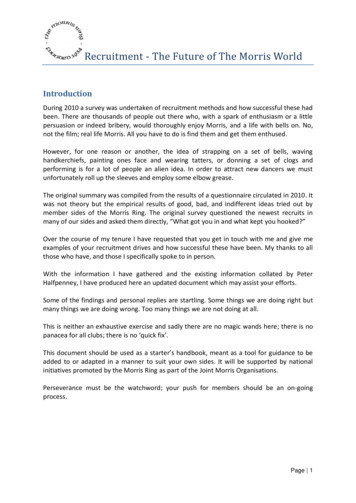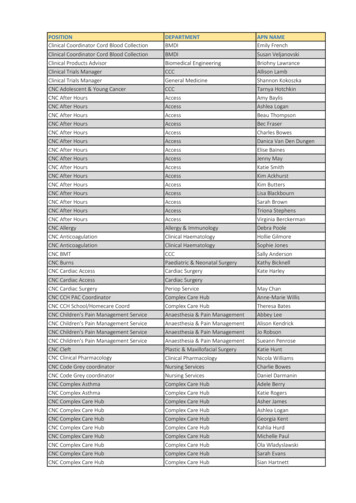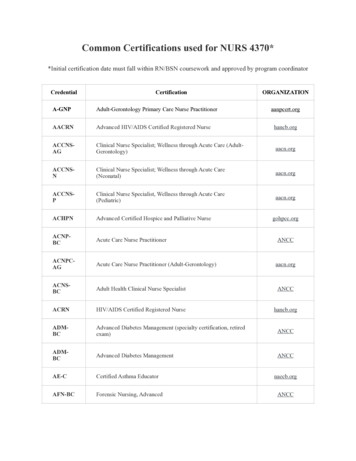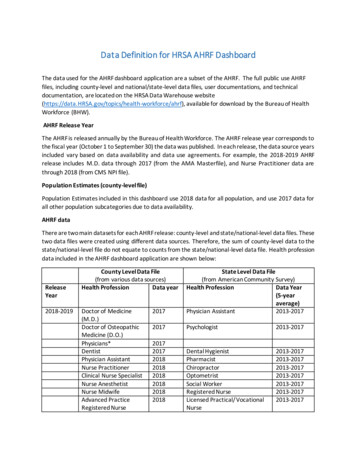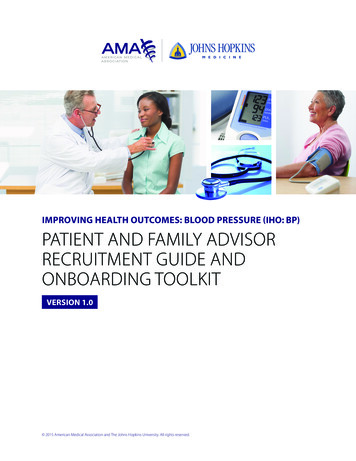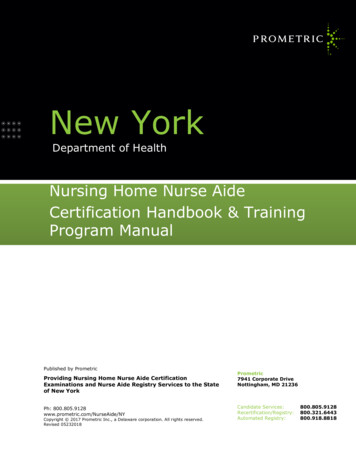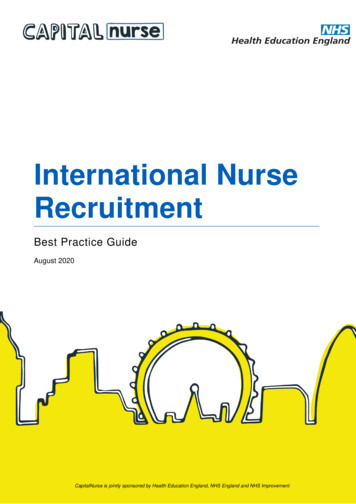
Transcription
International NurseRecruitmentBest Practice GuideAugust 2020CapitalNurse is jointly sponsored by Health Education England, NHS England and NHS Improvement
CapitalNurse – International Nurse RecruitmentTable of ContentsIntroduction . 3Background . 3Pastoral Support . 4OSCE and Education Support. 9Costing Framework . 18Useful information and Resources .20Appendices . 222Authors . .22Acknowledgements . 23References . 23Page 2 of 23CapitalNurse is jointly sponsored by Health Education England, NHS England and NHS Improvement
CapitalNurse – International Nurse RecruitmentIntroductionThe best practice guide has been developed to support a pan-London approach to internationalnurse recruitment that meets with best practice principles and ensures that both the overseasnurse (also referred to in some organisations as the internationally educated nurse) and theemploying organisation have a positive experience of the recruitment and employment processwhich should be efficient and effective in its nature. The guide will feature the international nurserecruitment electronic portal and will be available to both employing organisations and overseasnurses.The guidance is designed to be used in conjunction with the NHS Employers’ overseasrecruitment toolkit. It reflects best practice principles in line with ethical recruitment currentguidance and principles outlined by the bodies, such as the Nursing and Midwifery Council(NMC) and Health Education England Global. Changes taking place to the NMC registrationprocess and the Test of Competence (ToC) that are to be introduced in 2020 will be referencedon the pan-London portal and updated in the guidance as and when they are published. Theapproach has been developed through an extensive stakeholder engagement exercise from NHSorganisations across London, representing all fields of nursing. Engagement has included taskand finish group meetings, workshops, the CapitalNurse conference, and sharing best practiceacross organisations. We would encourage organisations to use the CapitalNurse branding ifusing any aspect of this best practice approach.For those nurses trained within the European Union (EU) or European Economic Area(EEA): The EU sets minimum training standards that nurses responsible for general care (adultnursing in the UK) and midwives must meet to be eligible to register and practise in their homemember state and across the EU. These standards are set out in Directive 2005/36/EC on theRecognition of Professional Qualifications. If the nurse trained in an EU or EEA member state,they will need to apply for recognition of their qualification and meet additional requirementsbefore they can be registered. They will not need to undertake a Test of Competence if theirnursing qualification is recognised. There are three different routes to recognition of qualification:Automatic, Acquired Rights and Individual Assessment. Guidance on recognition andassessment can be found here: eea/BackgroundLondon, England’s capital city, is one of the most interesting and vibrant cities in the world. Thereare a huge range of opportunities available for people who come from abroad to work and live inLondon. The hospitals and healthcare settings located across the capital are diverse in size andnature, providing an opportunity for overseas nurses to choose between living and working in theheart of London, on the outskirts in a smaller town, or countryside location. There are manyopportunities to care for people of all ages across all care settings and healthcare specialties.Page 3 of 23CapitalNurse is jointly sponsored by Health Education England, NHS England and NHS Improvement
CapitalNurse – International Nurse RecruitmentPastoral SupportThe pastoral support element that is provided to the overseas nurse throughout the recruitmentjourney and beyond is an essential one. Whilst organisations may differ in the specific details ofthe pastoral support they can provide, as a CapitalNurse best practice approach, eachorganisation should offer as a minimum some form of: Accommodation support Climatisation support Salary advancePre-arrivalPreparatory information material to support the overseas nurse in readiness for their arrival to theUK will help reduce some of the anxiety associated with relocating and working in a new country.Organisations may differ in how to prepare their overseas nurse the following considerationswere suggested and agreed by the CapitalNurse Overseas nurse Focus Group: A welcome letter to be sent prior to the arrival of theoverseas nurse setting the tone andgiving making them feel welcomed and valued by the organisation. It doesn’t need to beoverly formal, but you should consider referencing why you are looking forward towelcoming them to your organisation - what great benefits they will be getting by workingas an employee of your organisation. A welcome pack, included with your welcome letter enhances the first impressions anddeepens the overseas nurse’s understanding of the organisation. Sending it before arrivalto the UK has significant benefits for orientation, as it encourages the overseas nurse toresearch the organisation and the local area beforehand, which in turn will reduceanxieties on arrival. A full checklist of what to include in your welcome packs can be foundin appendix 1AirportCommunityfaciliitiesHamper PackTransportOverseasnurseAccomodationFinanceFig 2. Key considerations The Professional Development Guidebook has been developed as part of theCapitalNurse best practice guidance to enable the overseas nurse to capture theirdevelopment needs and career aspirations, prior to their arrival to the UK. The guidebookoutlines information on NMC revalidation and encourages reflective learning as the drivingvehicle to build upon continuous professional development (CPD) and careerPage 4 of 23CapitalNurse is jointly sponsored by Health Education England, NHS England and NHS Improvement
CapitalNurse – International Nurse Recruitmentconversations during and post the NMC registration stage to support the appraisalprocess.Additional considerations: Keeping a sense check on how things are going with them by checking in every couple ofdays will help avoid any challenges along the wayWithout startling them, be sure to advise them on pick pocketersPre-ordering of staff uniform/badgesPre-booking of essential appointments and attending with them will help with theonboarding process and give you additional time for induction and or OSCE preparation.Appointments to consider and to include in the first three days’ itinerary are:1. Occupational health appointments2. Outstanding HR checks (if applicable)3. Bank account arrangementsGood practice examplesTrust 1: Imperial College Healthcare NHS Trust have developed a useful welcome packthat provides an overview of the organisation including a full itinerary of the first three days ofarrival in UK. This is sent to the overseas nurse prior to their arrival in the UKTrust 2: Trust 2: Kings College Hospital NHS Foundation Trust have developed the‘King’s OSCE Pre-Course Preparation and Welcome Pack’ that contains useful information tohelp the overseas nurse prepare for their OSCE and to settle in the UK. It is expected thatthis is sent to the overseas nurse and that they read this prior to their arrival in the UK.Preparation for NMC RegistrationAirport pick upMeeting your overseas nurse at the airport on their arrival and transporting them to theiraccommodation is a vital part of the onboarding experience. This helps settle the overseas nursein orientating their new space and surroundings. If possible, it is good practice to includepreviously recruited overseas nurses to welcome them at the airport.AccommodationEnsure the overseas nurse meet with their accommodation team and obtain the keys and thecontract of tenancy is signed. It is good practice to provide up to four weeks accommodation andensure the overseas nurse understands the repayment process (if applicable). It is recommendedthat this information is included within their welcome packs prior to arrival, nonetheless it wouldbe advisable to check they understand the process again.Assistance with Bank/post officeOn route to the accommodation, consider visiting the post office to pick up the BiometricResidence Permits and factoring in their bank appointments on the day of their arrival (stronglyadvised if arriving on a Friday).Page 5 of 23CapitalNurse is jointly sponsored by Health Education England, NHS England and NHS Improvement
CapitalNurse – International Nurse RecruitmentFinancial SupportIt is essential to provide some form of financial support to the overseas nurse on arrival. A salaryadvance of approximately 500 in cash should be considered, as this will ensure that theoverseas nurse has access to cash should there be any delays in the bank account being set up.It is down to individual organisations to determine the reclaim period, however we recommendthis should be over a period of 12 months and commence after NMC registration.TransportationConsider purchasing a pre-topped up Oyster card for your overseas nurse. If your organisationreclaims for this, ensure this is explained. If your organisation does not provide this element ofpastoral care, we recommend as a minimum, to support the overseas nurse in purchasing Oystercards with their cash advance.Arrival PackFeedback has suggested that some form of arrival pack is helpful and could include linen,bedding, pillows, toilet paper, crockery, milk, eggs, rice, noodles, bread, butter, coffee, tea.Clinical PracticePlease see Managers Guide on Pastoral Support as a recommended approach to support theoverseas nurse.Greeting Lunch/welcome dinnerDepending on how you have structured the itinerary for the overseas nurse, you may wishfactoring in a welcoming event and invite previously recruited IEN, ward managers and otherclinical staff as part of their orientation. Welcoming them in your newsletter is also anothermethod of helping them feel included in your organisation.Navigating around the local communityHelping your overseas nurses with navigating around your hospital site(s) and local community isa good way of familiarising them with their surroundings. This could include taking them to thelocal supermarket, helping them use the tube/bus services, showing them the localchurch/spiritual place. You may wish to consider adopting the buddy system approach to supportwith the navigation.Buddy SystemPeer support from previously recruited overseas nurses is an excellent approach to supportingexisting cohorts for OSCE preparation, orientation and integration. This approach will havesignificant benefits in reducing anxieties and allaying fears.Page 6 of 23CapitalNurse is jointly sponsored by Health Education England, NHS England and NHS Improvement
CapitalNurse – International Nurse RecruitmentGood practice examplesTrust 1: Imperial College Healthcare NHS Trust offer a 3-day arrival package fromWednesday to Friday to help the overseas nurse settle in and to assist with administrative needssuch as their bank accounts, residential permits and support with integrating around Londoni.e. showing them how to purchase and use an Oyster card. In addition, Imperial provide awelcome lunch and introduce the clinical leads and previous cohort to support integration intothe workplace.Trust 2: Whittington Health purchase a hamper pack. For individual rooms the hamperincludes bread, butter, tea, coffee, eggs, toilet paper, soap, milk, biscuits - and for the largergrocery pack the overseas nurse share: onions, ginger, garlic, chillies, noodles, rice, tinnedtomatoes, curry powder. Crockery, bed linen, sheets, duvets, and pillows are not provided inthe hampers as these are included with the accommodation.Trust 3: Lewisham and Greenwich NHS Trust have introduced a ‘buddy system’ where eachoverseas nurse is linked to a previously recruited overseas nurse who helps them with practicalliving trips and in adjusting into the neighborhood. The newly recruited overseas nurses areintroduced to a local church that conducts services in their own languages within the first weekof their arrival in LondonTrust 4: University College of London Hospital (UCLH) have a successful social medianetworking support from previously recruited overseas cohorts in place for offering overseasnurses. What’s app and Facebook are used by the cohorts and lead nurse to keep connectedwith the overseas nurses, even prior to their arrival to the UK and to provide ongoing OSCEt t ll fPost NMC RegistrationIt is essential that pastoral support continues post NMC registration to encourage socialintegration into the work place with consolidation of skills as an NMC registered nurse. Theprofessional development guide for overseas nurses outlines the baseline to support theoverseas nurse beyond NMC registration with the following: Skills development Goal setting Personal Development planning Annual Appraisal Preceptorship RevalidationLike any health and social care organisation, there are challenges such as supporting anothermember of staff who may have different cultural values and experiences to the preceptor.Utilising your organisation’s educational leads/practice development nurses to touch base withthe preceptor and offer advice and/or coaching can play an integral part of pastoral care, both foryour overseas nurse and the preceptor.Overseas nurses gaining NMC registration with an ambition to give excellent patient care withcompassion and empathy could be affected in poor practice environments. A lack of staff, no rolemodels, little support and poor preceptorship could contribute to this; it is therefore essential toPage 7 of 23CapitalNurse is jointly sponsored by Health Education England, NHS England and NHS Improvement
CapitalNurse – International Nurse Recruitmentchoose an experienced preceptor with enough leadership qualities to be able to act as a rolemodel and provide a rich and bespoke preceptorship.Clinical supervision during and beyond preceptorship is an essential pastoral element of supportfor all nurses and other professionals, as it offers a safe environment to discuss difficult emotionaland social issues arising from patient care. For the overseas nurse, who is new to the registerand working in an unfamiliar clinical territory, it also offers a safe space to reflect on differentcultural experiences in practice. A preceptor will need to have good clinical supervision skills toprovide strong motivation, boost morale, confidence and reduce any distress that may arise,whilst giving timely, accurate feedback on practice. This will help the new overseas nurse makebetter decisions, solve problems that are holding them back, learn new skills, and otherwiseprogress their careers. You may consider using a coaching approach to enable some of thecareer and professional development conversations to take place. Using a coaching model suchas the GROW (see below) model is a simple yet powerful framework for structuring yoursupervision and sessions.Fig 2. GROW coaching model exampleGood practice examplesTrust 1: Royal Free NHS Foundation Trust have introduced a ‘guardian support system’beyond preceptorship. The overseas nurses are allocated a nurse within the organisation, butoutside of their clinical area to provide ongoing support and career coaching. The guardiansupporting the overseas nurse needs to have 10 years’ experience practicing as a registerednurse and could be at any banding level. The international recruitment team holds a livedatabase of the ‘guardians’ within the organisation. Once allocated, the guardian sends a letterto the overseas nurse to introduce themselves.Trust 2: University College of London Hospital (UCLH) have introduced the Standards forStudent Supervision and Assessment (SSSA) training into their preceptorship programme thatthe overseas nurse attends. The vision is that they will have developed skills through completionof a Preceptorship Open Learning Tool, attending a study day and having dedicated support inClinical Practice from the Practice Education Team. They will to be able to be practiceassessors for student nurses on successful completion of the 12 months Preceptorshipprogramme.Page 8 of 23CapitalNurse is jointly sponsored by Health Education England, NHS England and NHS Improvement
CapitalNurse – International Nurse RecruitmentOSCE and Education SupportIntroductionThe Nursing and Midwifery Council (NMC) introduced a Test of Competence (ToC) forinternationally registered nurses and midwives in October 2014. Nurses and midwives trainedoutside of the European Union (EU) / European Economic Area (EEA) are tested for their clinicalcompetence and knowledge through a two-part process to enable them gain registration in theUnited Kingdom (UK), including achieving language capability requirements – OET/IELTS,The ToC assesses candidates against the current UK pre-registration standards and is specific toa field of practice, including Adult Nursing (RN1), Mental Health Nursing (RN3), LearningDisability Nursing (RN5), Children’s Nursing (RN8) and Midwifery Nursing (RM). In 2020 the NMCwill be launching a new ToC in line with the Future Nurse Standards. The company that isdesigning the new Test will produce a range of materials to help candidates prepare. In addition,the Future midwife: Standards of proficiency for midwives will be launched in early 2020 and willbecome fully implemented by September 2021.The two parts of the ToC process include: Part one - Computer-Based Test (CBT), a multiple-choice examination whichis accessible around the world for applicants to access from their home countries. Part two – Objective Structured Clinical Examination, commonly known as the OSCE(which is always held in the UK at one of the approved test centres).Candidates must complete the entire UK registration application process within two years ofpassing part one which is their CBT. If a candidate is unable to do this, they will need to re-sit theCBT and begin a new application. Overseas nurses have up to 12 weeks from employment startdate noted on their certificate of sponsorship with the employing organisation to sit the OSCEexam. They can be legally employed as a pre-registration candidate during this preparation time.What is the OSCE?The OSCE is based on UK pre-registration standards. The OSCE comprises six separatestations, each lasting between 10-17 minutes. Four stations are scenario-based and relate to fourstages of the nursing and midwifery care process: Assessment- holistic patient-centredPlanningImplementationEvaluationTwo stations test practical clinical skills; many of these nursing or midwifery skills will have beenutilised in the nurse’s practice several times before.The format of the OSCE may change with revisions to the ToC in 2020.Page 9 of 23CapitalNurse is jointly sponsored by Health Education England, NHS England and NHS Improvement
CapitalNurse – International Nurse RecruitmentApproved OSCE Test CentresThere are three universities which are approved OSCE test centres, providing a choice of fourlocations to sit the OSCE: Ulster (Derry-Londonderry), Northampton, Brookes (Oxford andSwindon). Each of the universities offer the OSCE in the different fields of nursing and midwifery.OSCE preparation and educational supportPre-Arrival to the UKPreparatory information materials on personal development, educational pathways and OSCEtraining will support the overseas nurse with their personal preparations for arrival to the UK andduring their preparation for the NMC registration period. Information provided to the individualneeds to be balanced and it is important not to overload the new overseas nurse with too muchinformation at this stage. It is recommended that the information that is provided to the overseasnurse is only an overview of the NMC OSCE requirements and the educational support theyshould expect re OSCE preparation in the first few months after they arrive in the UK. Thisinformation can include NMC website details with regard to exam blueprints and the relevant testcentre’s website and Health Education England information and resources.Good practice examplesTrust 1: The Royal Brompton and Harefield NHS Foundation Trust have developed ashort two-page leaflet, ‘International Nursing OSCE Training Programme’ that provides anoverview of their OSCE training programme with some other general information, available viatheir website: eTrust 2: Kings College Hospital NHS Foundation Trust have developed the ‘King’s OSCEPre-Course Preparation and Welcome Pack’ that contains useful information to help theoverseas nurse prepare for their OSCE and to settle in the UK. This pack contains a teamphoto and is sent to the overseas nurse prior to their departure, giving them the opportunity toread about what to expect once they arrive.Trust 3: Chelsea and Westminster NHS Foundation Trust: The overseas nurses (from thePhilippines) undertake a Pre-Departure Orientation Seminar (PDOS) prior to arrival in the UKand this is provided by the recruitment agency. They are given general information about lifein the UK and about the Trust. As part of this the agency provides the nurses with an OSCEboot-camp that gives them an overview of the OSCE.Preparation for NMC RegistrationTo ensure candidates have adequate time to prepare for the OSCE, they are given up to 12weeks to complete the examination. In the run-up to the examination, candidates must be givensupport and the opportunity to practice and prepare for the OSCE. The experience a candidatehas in their first few weeks is vital to their success in the OSCE.The NMC's registration process no longer requires applicants to complete a period of supervisedpractice, therefore the importance of establishing a quality and well-structured induction andtraining programme is critical.Page 10 of 23CapitalNurse is jointly sponsored by Health Education England, NHS England and NHS Improvement
CapitalNurse – International Nurse RecruitmentIn preparation for the OSCE, it is important that candidates have reviewed and are familiar withthe NMC nursing blueprints. These will now be based on the Future Nurse Standards and are theNMC’s standards for competence which all student nurses/midwives must acquire before theycan successfully register as a nurse/midwife in the UK. The examination blueprints set out thescope and content of the OSCE in terms of the topics, skills and procedures that the newlyregistered nurse/midwife will need to know and be able to demonstrate. Find out more andaccess a copy of the blueprints on the NMC website. There are specific competencies outlinedfor the different fields of nursing with online resources available within the competencydocuments.Corporate and Clinical Induction programmeA thorough theoretical and practical induction to the organisation and to the candidate’s clinicalarea, where this is relevant, is essential to ensure there is a positive experience from the outset.This will make the overseas nurses feel part of the Trust and provide the opportunity to engagewith other new starters and new nurses. The timing and structure to corporate and clinicalinduction will vary between organisations but the principle is that the overseas nurse will feel wellinformed and supported to integrate into the organisation during an agreed programme ofinduction and orientation. The corporate element will need to feature at the most appropriate timetaking into consideration the structure of the orientation and OSCE training programmes.If there is a period of supervised practice in a clinical area, the overseas nurse should besupported by a supervisor, supplemented with regular release for OSCE preparation sessionswith a named Clinical Facilitator/Trainer.Good Practice ExamplesTrust 1: Whittington Health NHS Trust offers a comprehensive induction to the organisationfor the overseas nurses. This takes place over a three-week period and includes a detailedcorporate induction during the second week. Following that, the Trust offers a period of 2 to 3weeks dedicated OSCE training, practice and assessment leading to the OSCE itself. Anoverview of this is outlined in the ‘Whittington Health Handbook for Nurses and Midwives’ aspart of the information on Training for OverseasNurses. https://www.whittington.nhs.uk/document.ashx?id 10820Trust 2: London North West University Healthcare NHS Trust provide a two-weekinduction which is outlined in their ‘International Educated Nurses (IENs) Programme Detailsand Guidelines’. Their IEN programme runs over 8 weeks in total.Pre-employment - the overseas nurse is sent a Pre-Employment Directed Learning documentthat supports their knowledge and training when they attend face-to-face mandatory trainingscheduled in the IEN Programme. All overseas nurses are registered for NHS email accountsand must complete some on-line mandatory training before they arrive in the UK.Weeks 1-2 - On arrival the overseas nurses are welcomed by senior nursing and clinical staff.A meet-and-greet evening reception is organised and is attended by candidates from priorprogrammes. Banking, accommodation and Occupational Health appointments take placeover the two-week period including Corporate and Local Induction.Page 11 of 23CapitalNurse is jointly sponsored by Health Education England, NHS England and NHS Improvement
CapitalNurse – International Nurse RecruitmentWeek 3-8 - Formal programme preparation for OSCE assessment and adaptation to theNHS. An IEN Competency Framework must be completed within the 8-week timeframe.Nurses. https://www.whittington.nhs.uk/document.ashx?id 10820Key Principles for preparing candidates for the OSCEThe following principles were agreed by the Capital Nurse OSCE Best Practice Task and FinishGroup (October 2019) which included representation from provider organisations across London.Practical Elements of the Preparation/Training Programme The programme should combine theory and practice within the classroom environment.The environment for practical teaching of clinical skills should ideally be in a clinicalsimulation type setting/bespoke clinical facility; where this is not available the layout of thetraining area should reflect the clinical environment as much as possible with theappropriate clinical equipment.Informal assessment should be offered throughout the OSCE training programme with aformal mock OSCE to be undertaken at least 1-3 weeks before the OSCE date to helpidentify if the overseas nurse is ready for their examination proper.The programme should fully prepare the candidates to undertake the NMC OSCE andprepare them for employment as a band 5 Registered Nurse in a range of clinical areas.Teaching should be provided by senior nursing staff and dedicated education team staffsupported by registered nurses who have previously passed their OSCE exam. It isrecommended that there is a ratio of no greater than one trainer to 10-15 overseas nursesfor practical skills training to ensure that teaching and support is effective for both thefacilitator and the overseas nurses. Best practice guidance for other practical skillstraining recommends no more than 8-12 people per practical skills training session.Theoretical training sessions can be classroom style and can allow for more participants.Study days should be offered as protected learning time for staff participating in the OSCEprocess and where they are working clinically during this training period time should beincorporated into their shift allocation.Mock exams should include four nursing process stations covering assessment, planning,implementation and evaluation. All clinical skills that could potentially be assessed shouldbe covered at two clinical stations. Skills are assessed on a field of nursing practice, forexample adult nursing.Ensure practice areas are organised in the same way as the OSCE, with simulatedpeople in a hospital/community setting, so that this becomes familiar.Ensure that the overseas nurse has plenty of time to practice their skills prior to taking theOSCE.Individual feedback should be provided to participants to ensure there is ongoing learningand to support better preparation for the actual examination.Additional considerations: There should be consideration of the numbers of overseas nurses being recruited to theorganisation and numbers arriving at any one time – the numbers of participants on anytraining programme needs to be in line with educational facilities and numbers of trainersavailable to ensure a positive experience and a successful outcome.Page 12 of 23CapitalNurse is jointly sponsored by Health Education England, NHS England and NHS Improvement
CapitalNurse – International Nurse Recruitment Ensure the programme helps empower the overseas nurse with practice and experience,and the ability to verbalise and demonstrate the
The guide will feature the international nurse recruitment electronic portal and will be available to both employing organisations and overseas nurses. The guidance is designed to be used in conjunction with the NHS Employers' overseas recruitment toolkit. It reflects best practice principles in line with ethical recruitment current
